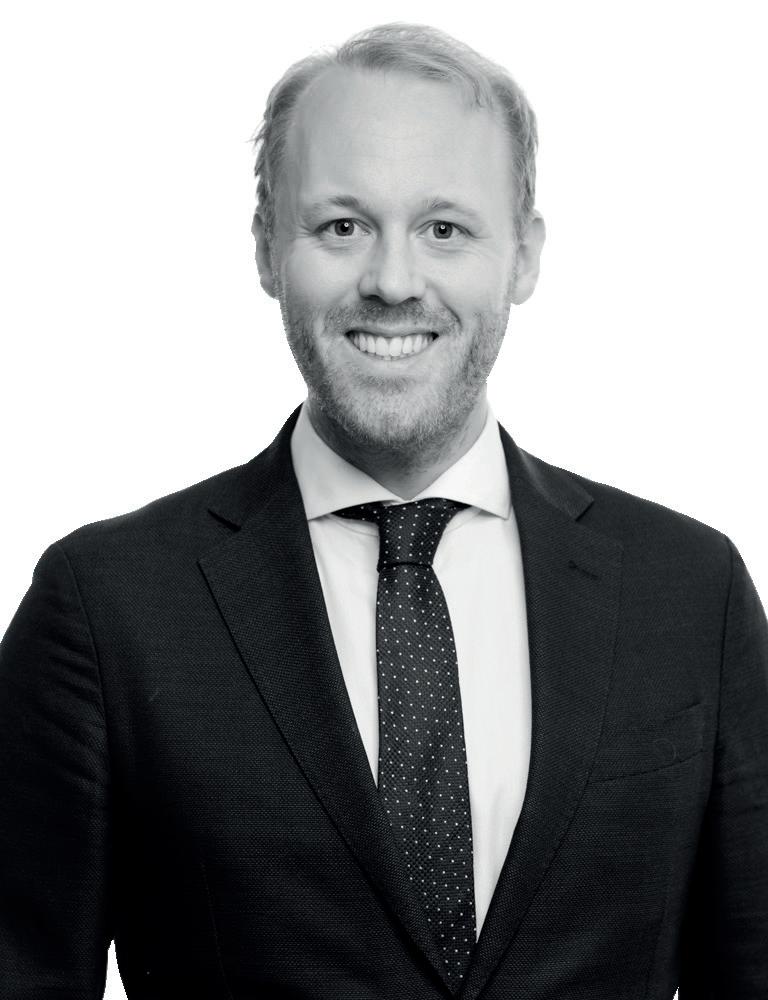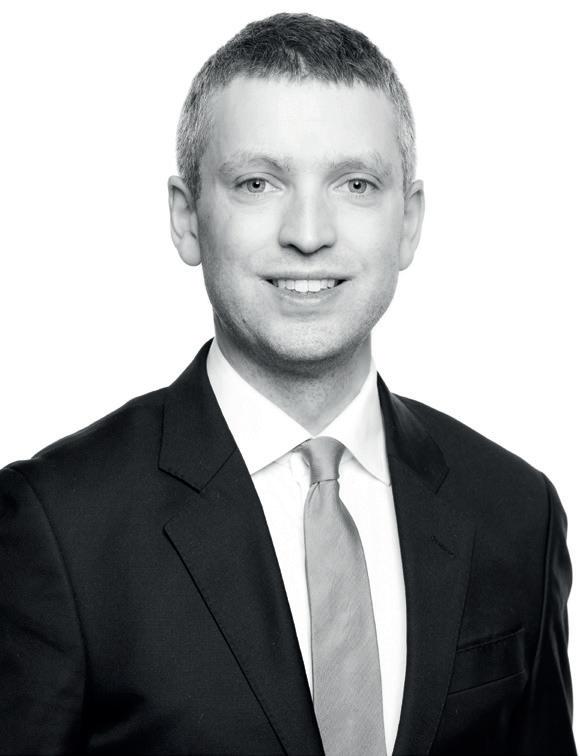
6 minute read
Third Party Dispute Funding on the agenda
Introduction
The cost of litigation and arbitration in complex commercial disputes has increased significantly over the last decade. In response to rising costs, the international market for third-party funding (“TPF”) has developed. TPF reduces constraints on the claimants’ liquidity and provides for a potential upside for investors.

In Norway, TPF has recently received increased attention due to an opt-out class action against two providers of home-alarm systems. The class representative is funded by a third-party funder and has inter alia asserted that the funder’s fee may be recovered as litigation cost and has requested the court to “pre-approve” the cost. The case will be heard by the Supreme Court later this spring and we expect the decision from the Supreme Court to clarify several contested questions related to TPF in Norwegian law.
With the above-mentioned case making its way to the Supreme Court, the spotlight has firmly been put on TPF in Norwegian procedural law. In this article, we discuss four topics that are relevant for the Norwegian TPF market.
Regulatory framework for ThirdParty Funding in Norway
TPF is currently not monitored in Norway on a regulatory level. The Financial Supervisory Authority (“FSA”) has however decided that the only provider of TPF in Norway is subject to licensing from the FSA. The provider has appealed this decision to the Norwegian Ministry of Finance. If subject to licensing from the FSA, thirdparty funders will have to comply with a larger body of regulation. This is in turn likely to affect the Norwegian market for TPF.
Agency problems and ethical challenges
It is a fundamental principle that lawyers must represent and always act in the clients’ best interest. An agreement for TPF may challenge this principle as it, in effect, also introduces another party with a direct interest in the outcome of the dispute, i.e., the funder. And although the client and the funder may share an overall interest in the best possible outcome of the case, the underlying perspectives may differ.
Whilst the funder will generally have a purely monetary interest in the dispute, the client’s interests may be more varied and nuanced. For instance, a client may have an interest in maintaining a professional relationship with the counterparty, in setting a legal precedent through a court decision or demonstrating an ability to “stand firm”. These different perspectives and conflicting interests may lead the client and funder to have different opinions on, for instance, settlement proposals or other crossroads during the proceedings. It is therefore essential to discuss and agree on how such conflicts should be resolved prior to the initiation of the proceedings. Although there are different ways of handling such conflicts, certain best-practice provisions have been developed by the Association of Litigation Funders through a Code of Conduct. Allthough not targeted directly towards the Norwegian market and Norwegian legislation, the Code of Conduct seeks to ensure that TPF does not interfere with professional and ethical obligations trough generally applicable provisions. Such best-practice provisions may provide a useful and practical framework for handling agency problems and possible TPF related ethical challenges.
Loser pays for Third-Party Funding?
Like most jurisdictions, the Norwegian Dispute Act generally applies a cost-shifting rule based on the “loser pays” principle, with the main rule being that the prevailing party may recover its “necessary cost” from the losing party. In arbitration, costs are generally awarded on a discretionary basis in accordance with the Arbitration Act, but typically along largely similar lines.
In principle, there are two different categories of costs associated with TPF and that we will comment on here: The costs that are directly linked to the funder’s compensation, which normally will constitute the biggest cost element, and increased litigation costs that may be due to the TPF-agreement. There are relevant differences between these categories when assessing the recoverability of the costs.
Litigation costs are expenses that parties to legal proceedings typically incur. This generally includes costs such as fees to the legal counsel and disbursements, such as expert costs, travel expenses and court fees. The question is whether the funder’s compensation could also be regarded as recoverable costs pursuant to the Dispute Act and Arbitration Act? One Norwegian first instance court ruling (Atlant v. Oslo Municipality) concluded that the third-party funding fee was not recoverable pursuant to the rules in the Dispute Act.
However, the principle that funding fees are not recoverable as legal costs is challenged and on the agenda in the opt-out class action mentioned above, and we expect further clarifications on the topic to be provided by the Supreme Court. In particular, the decision from the Supreme Court is expected to clarify the admissibility of “pre-approval” of TDF as legal costs.
It should be noted that awards from the ICC (Tenke Fungurame Minin S.A. v. Katanga Contracting Services S.A.S & Essar Oilfield Services Ltd V Norscot Rig Management Pvt Ltd) have opened the possibility for funded parties to recover TPF costs from the losing party if the costs were necessary for access to justice. Whether this also will apply in Norwegian courts or arbitrations, remains to be seen.
Further, the TPF might generate additional legal or other costs due to the possible increased work load that might be associated with TDF. Such additional costs will likely be recoverable pursuant to the Dispute Act as litigation costs if they pass the test of being necessary and reasonable.
Disclosure of Third-Party Funding
How a party wishes to finance his or her claim, is normally irrelevant for deciding the substance of the case. Consequently, there is no general obligation to disclose the existence or identity of a funder under Norwegian law. However, both institutional and best practice arbitration rules encourage disclosure of TPF. Examples are the ICC Rules Article 11 7) and Article 18 to the SCC Rules. It is also recommended by international institutions such as ELI/ UNIDROIT (Model European Rules of Civil Procedure).
The rationale behind imposing a duty to disclose any agreements for TPF is to ensure the judges’ or arbitrators’ impartiality and independence from the parties. At least, the parties to the dispute should be aware of any connections or ties judges or arbitrations may have to entities that have a direct and intimate interest in the outcome of the dispute, which a third-party funder will have. Early disclosure of agreements for TPF may therefore be vital to ensure trust in the fairness of the proceedings, but also as a tool to prevent subsequent challenges. Such considerations are also relevant in a Norwegian context. It could therefore be argued that disclosure should be considered best-practice also under Norwegian law. Consequently, we expect that disclosure of TPF will be on courts’ and tribunals’ agendas going forward.
Looking ahead
For clients, the possibility of TPF may reduce the liquidity constraints that large commercial disputes can impose. It can even be vital in securing clients their ‘day in court’. On the other hand, TPF will often be considered a high-risk investment, which normally will be reflected in the funder’s compensation.
Having touched on some of the topics that are being placed on the agenda with the increased attention on TPF, only one thing is for certain: Many more questions will arise. There are interesting times ahead with the mentioned Supreme Court decision which is likely to be rendered prior to the summer of 2023. The Ruling is likely to clarify questions that will be instrumental for the further development of TPF in Norway. Similarly, the awaited decision from the Norwegian Ministry of Finance will also be decisive for the further development in this area of litigation and arbitration.
BAHR’s Dispute Resolution Team has experience with TPF acting both for and against funded parties. We also provide second-opinion reviews to financiers and parties alike. As such, we monitor the ongoing legal and market developments with great interest.
Bjørn Eikanger Hanssen Associate
E: bjhan@bahr.no
M: +47 992 34 117
Bjørn Eikanger Hanssen joined BAHR in 2022 and is a part of BAHR’s Energy and Environment group. He primarily advises on contractual matters and dispute resolution in the energy sector. Bjørn wrote his master thesis on third party funding.

E: eiwig@bahr.no
M: +47 917 93 846
Eirik acts as counsel in a wide range of commercial disputes with an emphasis on professional and shareholder liability matters. Recent cases include appearing before the Court of Appeal (Borgarting division) as lead counsel for the successful appellant in a professional liability matter arising out of a commercial real estate transaction.


Skjold Søgaard Partner
E: sss@bahr.no
M: +47 900 21 287
Simen is admitted to the Supreme Court and rejoined BAHR as partner after six years at the Office of the Attorney General (Civil Affairs) in April 2022. Simen represents clients in all forms of commercial disputes, including insurance matters, tax/VAT litigation and matters involving public authorities.




